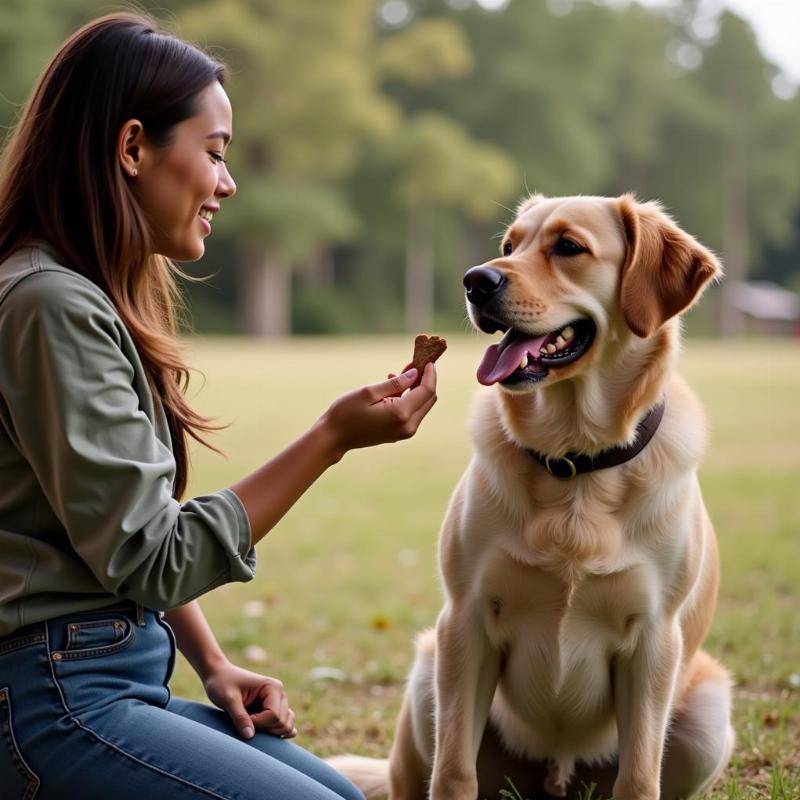Do dogs know when they did something wrong? This is a question that has puzzled dog owners for centuries. While our canine companions may sometimes appear guilty, understanding their behavior requires looking beyond human interpretations. Let’s delve into the canine mind and explore the science behind their actions.
Decoding Doggy “Guilt”
That “guilty” look—ears back, tail tucked, eyes averted—is often interpreted as a sign of remorse. However, research suggests this behavior is more likely a response to your cues, such as your tone of voice and body language, rather than an understanding of their transgression. Dogs are masters of reading human emotions and react accordingly. They’ve learned that certain behaviors appease us when we’re upset, even if they don’t understand the reason for our displeasure.
Canine Cognition and Understanding Consequences
Dogs live in the present. While they are incredibly adept at learning associations, their understanding of cause and effect is limited in a way that differs from human understanding. They may associate your anger with the ripped-up pillow, but not necessarily grasp the concept that their chewing caused the damage. Instead, they associate the destroyed pillow with your negative reaction.
Training and Positive Reinforcement: The American Approach
 Huấn luyện chó bằng phương pháp khen thưởng tích cực
Huấn luyện chó bằng phương pháp khen thưởng tích cực
In the US, positive reinforcement training methods are widely embraced by organizations like the American Kennel Club. This approach focuses on rewarding desired behaviors rather than punishing unwanted ones. Consistency is key. Clear communication and consistent expectations help your dog understand what you want from them, minimizing the chances of “misbehavior” in the first place. Remember, prevention is always better than cure!
Mistaken Identity: Why Your Dog Might Seem Guilty When They’re Innocent
Sometimes, a dog may display “guilty” behavior even when they haven’t done anything wrong. This can be confusing for owners. Imagine coming home to a chewed-up shoe and your dog immediately cowering. It seems like a confession, right? However, your dog might simply be reacting to your immediate anger and frustration, anticipating a negative reaction based on past experiences.
So, Do They Really Know?
The short answer is: probably not in the way humans understand “knowing” they did something wrong. Dogs excel at associating actions with consequences, but their understanding of abstract concepts like morality and guilt is different from ours.
Do Dogs Feel Remorse?
While dogs might not experience guilt in the same way we do, they certainly experience emotions. They can feel anxiety, fear, and stress. A dog who has been scolded may display appeasement behaviors due to anxiety, not guilt. Building a strong, positive relationship with your dog based on trust and understanding is crucial.
Conclusion
While the question of whether dogs know when they’ve done something wrong is complex, focusing on positive reinforcement, clear communication, and understanding canine behavior will create a happier and healthier relationship with your furry friend. Remember, consistency, patience, and a loving approach are the keys to a well-behaved and well-adjusted dog.
FAQ
- How can I tell if my dog is anxious, not guilty? Look for signs like panting, yawning, lip licking, whale eye (showing the whites of their eyes), and tucked tail.
- What are some effective positive reinforcement techniques? Using treats, praise, and toys to reward desired behaviors.
- Is it ever okay to punish a dog? Punishment can damage your relationship with your dog and lead to behavioral problems. Focus on positive reinforcement instead.
- Why is consistency important in dog training? Consistency helps your dog understand expectations and learn more effectively.
- What should I do if my dog continues to exhibit unwanted behaviors? Consult a certified professional dog trainer or veterinarian behaviorist for guidance.
- How can I make my dog feel safe and secure? Provide a predictable routine, a safe space, and plenty of positive interactions.
- Where can I learn more about positive reinforcement training? The American Kennel Club website and local dog training clubs are excellent resources.
Beautdogs.us is your premier source for all things dog-related in the US. We offer expert advice on dog breeds, care, training, and products. Whether you’re a new dog owner or a seasoned pro, Beautdogs.us provides reliable, comprehensive, and engaging information to help you navigate the wonderful world of canine companionship. Contact us today to learn more! Email: [email protected], Phone: +1 501-555-7529. Visit Beautdogs.us for expert advice and resources.